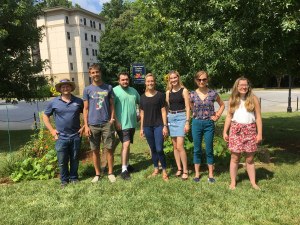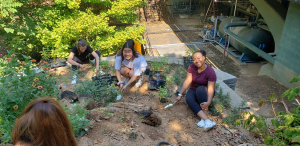By: Jamie Lutz, Intern, Office of Sustainability Initiatives

Emory students and staff have been growing food together for years through the Educational Gardens across campus, coordinated by the Office of Sustainability Initiatives. This past summer, Gardens Coordinator, Erik Edwards, introduced two new programs to engage a wider community with the campus gardens in new and exciting ways.
Every summer, the Emory Autism Center hosts groups of young adults who have been diagnosed with Autism Spectrum Disorder to participate in a social engagement program called myLIFE. Hosted on Emory’s Clairmont Campus, the myLIFE program creates a safe haven where group members with social interaction difficulty have the opportunity to engage in fun activities in order to learn, practice, and further develop social and personal skills. Many of the participants are building life skills in order to successfully live on their own for the first time.
For the first time this year, Erik Edwards partnered with Toni Thomas, the myLIFE Program Manager, to offer gardening at the Clairmont Campus Educational Garden as one of the program activities. MyLIFE participants were given the option to get their hands dirty in the Clairmont Educational Garden over a series of two week-long educational activities. Though not all the myLIFE participants chose to engage with the garden, those that did found it extremely rewarding. In fact, one participant was so excited about the project that he continues to volunteer in the Clairmont garden every week!
Another new addition to the Emory Educational Gardens is a pollinator garden behind the Cox Hall Garden. Part of the Rosalynn Carter Butterfly Trail, this garden is one of hundreds across the United States and Canada that seek to create more supportive ecosystems for monarch butterflies and other pollinators. Hundreds of public and private organizations as well as individuals have registered butterfly gardens as part of the trail. While the focus is particularly on protecting monarch butterflies by planting milkweed (which the monarchs need to lay their eggs), all pollinators benefit from the native nectar and host plants.

The idea to start this pollinator garden at Emory came from Dr. De Roode, a biology professor whose research focuses on protozoan parasites in monarch butterflies. “Many pollinators are suffering from habitat loss and pesticides, and iconic species such as honey bees and monarch butterflies are in real trouble,” says De Roode. “Building pollinator gardens is not only important for creating habitat for these important animals, but also to raise awareness about their plight.”
“Emory has been a national leader in comprehensive pollinator protection, adopting a campus-wide policy in 2014 that bans the use of harmful neonicotinoid pesticides, while supporting the enhancement of pollinator habitats across campus,” says Taylor Spicer, Programs Manager for Emory’s Office of Sustainability Initiatives. “With the addition of this new pollinator garden, Emory faculty, staff and students are further validating Emory’s commitments and realizing our goals to safely enhance pollinator habitat.”
The new pollinator garden and the partnership with myLIFE are the newest additions to a wide range of Emory initiatives aimed at increasing awareness about sustainable ecosystems. Edwards says, “The partnership and collaboration with myLIFE and the Rosalynn Carter Butterfly Trail have been great additions to the Emory Educational Garden Project because they speak to the core goals and values of the project – community, education, better health through a connection to your source of food, and of course, protection of the environment and sustainable human living.”
To learn more about the many ways Emory is working to protect native species and biodiversity, visit: https://sustainability.emory.edu/initiatives/grounds/.
